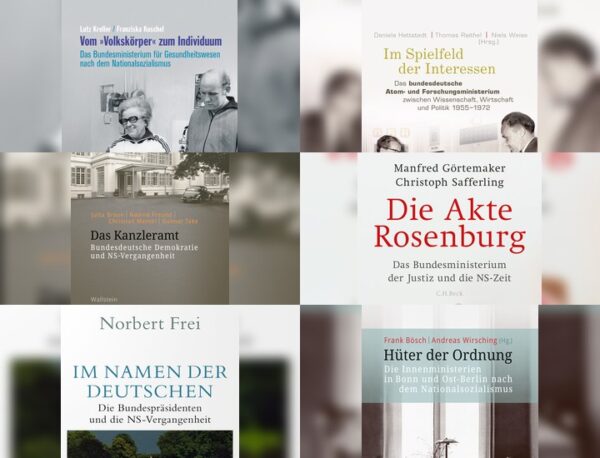In 2010, the publication of Das Amt und die Vergangenheit (The Ministry and the Past) started a yearslong academic and public debate. The book was an authorized history of the German Foreign Office and its Nazi past, and vigorous discussion ensued about its scholarly merits and political conclusions. The controversy illustrated that there was then tremendous interest in discussing the Nazi past in Germany, and since Foreign Minister Joschka Fischer first green-lit historians’ research into the Foreign Office in 2005, the German historical profession has been occupied for two decades completing nearly two dozen similar federal ministerial research projects.

More than 20 volumes have been published since 2010 that delve into the postwar history of West German federal ministries and their Nazi pasts. Book covers courtesy publishers C.H. Beck and Wallstein Verlag.
This year, historians from the Institute for Contemporary History in Munich and the Center for Contemporary History in Potsdam completed Das Kanzleramt: Bundesdeutsche Demokratie und NS-Vergangenheit (The Chancellery: Democracy in the Federal Republic and Nazi Past), a study of the West German Federal Chancellery and its Nazi past from the 1940s through the 1980s, closing the last major gap in the projects examining the federal ministries’ Nazi pasts. With its publication, all “top level” federal agencies and the five “classical ministries” (Foreign Office, Interior, Justice, Defense, and Finance) have now had the Nazi pasts of their organizations and their histories in the early West German state researched by teams of historians.
The winding down of this 20-year period of intense research provides an opportunity to reflect on its meaning. So far, none of these studies have been translated into English, so though these projects have occupied our German colleagues for decades, they have received little attention in the United States. The Ministry and the Past sold far more copies than the typical scholarly history book. Fifteen years later, new studies have a much smaller readership, mostly experts and the ministries’ staff themselves. Government agencies celebrate their own “working through the past” projects; instead of representing a danger to the agency’s prestige in the present, the research findings offer a corrective to public criticism about their unexamined Nazi pasts. Because of this, federal ministries have been largely supportive of research projects, guaranteeing access to documents and not interfering in the research results.
Federal ministries have been largely supportive of research projects, guaranteeing access to documents and not interfering in the research results.
These official studies have done much to cast into doubt a purely teleological success story of West Germany. The prevailing narrative of the postwar era portrayed a triumphal rise of West Germany from the ashes of 1945 to a thriving and successful state integrated into democratic Western Europe by the end of the 1950s. This relied on a myth that 1945 was a zero hour of German history, when authoritarian traditions were broken by the defeat of Nazi Germany and the country began anew in a continuous arc toward a more democratic state. Instead, the ministries research cast light on the long continuities of German history from the Wilhelmine state in the late 19th century through the Weimar Republic, National Socialism, occupation, and the refounded West German state in 1949. It has pointed to the antipluralist and authoritarian statist tendencies of government during the early years of West Germany. It has shown that far from the 1950s being an “era of silence,” state ministries were highly aware of the Nazi pasts of their colleagues and tried to suppress that information for fear of bad publicity that could affect Cold War politics. At the same time, this research has shown how the West German state was a model for stability in the 1950s. Former Nazi perpetrators at the highest levels of government and the small minority of victims of National Socialism who returned to government somehow managed to work together to reconstruct the state. Generally, however, the success of reintegrating former Nazis into the political system was achieved at the cost of excluding victims of Nazism and rejecting their calls for justice.
Critics have derogatorily named these ministerial projects “Nazi counting.” They have cast doubt on whether the research is conceptually interesting and moves the field forward. As Germany drifts into the same “history wars” that have plagued the American discipline for some time, representatives of the right-wing Springer Press have accused the historical commissions of “moralizing” or “identity politics” for focusing on former Nazis in federal ministries and identifying attempts to exclude Jews, women, and Social Democrats from the government. The claim that critical histories of a nation’s founding represent a betrayal of academic standards and a “politicization” of history will sound familiar to American historians, who have faced the same accusations by those who want to uphold a founding national myth.
Yet many criticisms of these studies are unfounded. For some time, German historians have distinguished between “formal” and “material” guilt regarding the activities of future West German government officials during the Nazi state. “Formal” guilt, defined as membership in the Nazi Party or one of its many organizations, is a continuation of the categories developed during the denazification of Germany—a fleeting attempt by the Allies at a lustration of German government and society. During the 1950s, most ministries had a “formal guilt” that hovered around 50 percent Nazi Party membership but could approach 80 percent or more, depending on the ministry. “Material” guilt, on the other hand, refers to the concrete actions of individuals in the Nazi state, much of which could have been seen as prosecutable in trials after the Second World War. These actions were performed by a smaller percentage of most ministries.
The most infamous example is Hans Globke, right-hand man to Chancellor Konrad Adenauer and author of an important legal commentary on the Nuremberg Race Laws. In Adenauer’s government, Globke was the state secretary, meaning he ran the chancellery and coordinated many of the foreign policy and domestic security measures of West Germany in the 1950s. His is only one of numerous such biographies found in the ministerial histories.
It has never simply been about “counting Nazis,” but rather about reconstructing biographies of high-ranking civil servants and decision-makers in Germany’s turbulent 20th century. These studies collectively reveal much about the delayed democratization and pluralization of German government and society, while pointing to the importance of a robust parliamentary tradition, an independent judiciary, and a free press as balanced powers to a stubbornly authoritarian ministerial bureaucracy.
Some new ministerial research projects reach beyond the federal level, extending the focus beyond the Nazi past and the periodization beyond the 1970s. As time marches on, contemporary historical research naturally asks which periodization best represents issues in contemporary history. Historians ask different questions about the period after 1970 or after the fall of the Berlin Wall in 1989. Welcome research avenues in the German historical field include economic history after the booming postwar years came to an end, the way the state responded to growing public consciousness about the Holocaust in the 1980s and 1990s, state responses to the digital era, the gender politics of women entering previously male-dominated ministries, the history and posthistory of the East German ministries and the legacies of communism, and the many different ministerial responses to growth of left-wing and Islamist terrorism in the 1970s and the growth of the far right since the 1980s.
New ministerial research can and should ask questions about how the German state has responded to the fact that Germany has become a “migration society.”
Perhaps most pressingly, new ministerial research can and should ask questions about how the German state has responded to the fact that Germany has become a “migration society” since the 1980s but especially since the fall of the Berlin Wall. For decades, millions of immigrants have made their home in Germany, and yet, until recently, they did not fit into an ethnic-national sense of citizenship held by many Germans.
A fair criticism levied at ministerial research was always that—rather like criminal prosecutions of Nazi perpetrators looking to achieve some justice for survivors—it happened too late to be consequential for those in power. By the early 2000s, all the relevant actors in ministries from the 1950s had long retired, and most were dead. In the context of immigration politics today, just as the forerunners to scholarship in the field of public memorial cultures for Nazi atrocities in German civil society were filled with a sense of the “fierce urgency of now,” contemporary historians must rediscover research into government asking critical questions about the present.
A teleological reading of German history is made easier by pundits in the United States and Europe, who see Germany as a democratic success because it is yet to see a 21st-century populist nationalist movement come to power. Though Germany has not seen a Brexit or MAGA-level movement, leaders of the right-wing Alternative for Germany (AfD) party want to demolish the infrastructure of research and remembrance around Nazi Germany and pursue an anti-immigrant nationalist agenda. The electoral success of this party has moved the general discourse in Germany about immigration much farther to the right, leading immigration restriction to become the main policy discussion of most major parties in the 2025 federal parliamentary elections. AfD has grown to be the second-strongest party in the German parliament, but it has already succeeded in changing the language used around immigration and identity in the country.
So the question remains: What obligation do historians have to ask crucial questions about the state, before it is once again too late to be consequential to those in power?
Samuel Miner is a postdoctoral researcher at the Institute for Contemporary History in Munich, Germany, and author of The Anti-Nazi Origins of Militant Democracy: Germany’s Constitutional Tribunes (Cambridge Univ. Press, 2026).
This work is licensed under a Creative Commons Attribution-NonCommercial-NoDerivatives 4.0 International License. Attribution must provide author name, article title, Perspectives on History, date of publication, and a link to this page. This license applies only to the article, not to text or images used here by permission.


